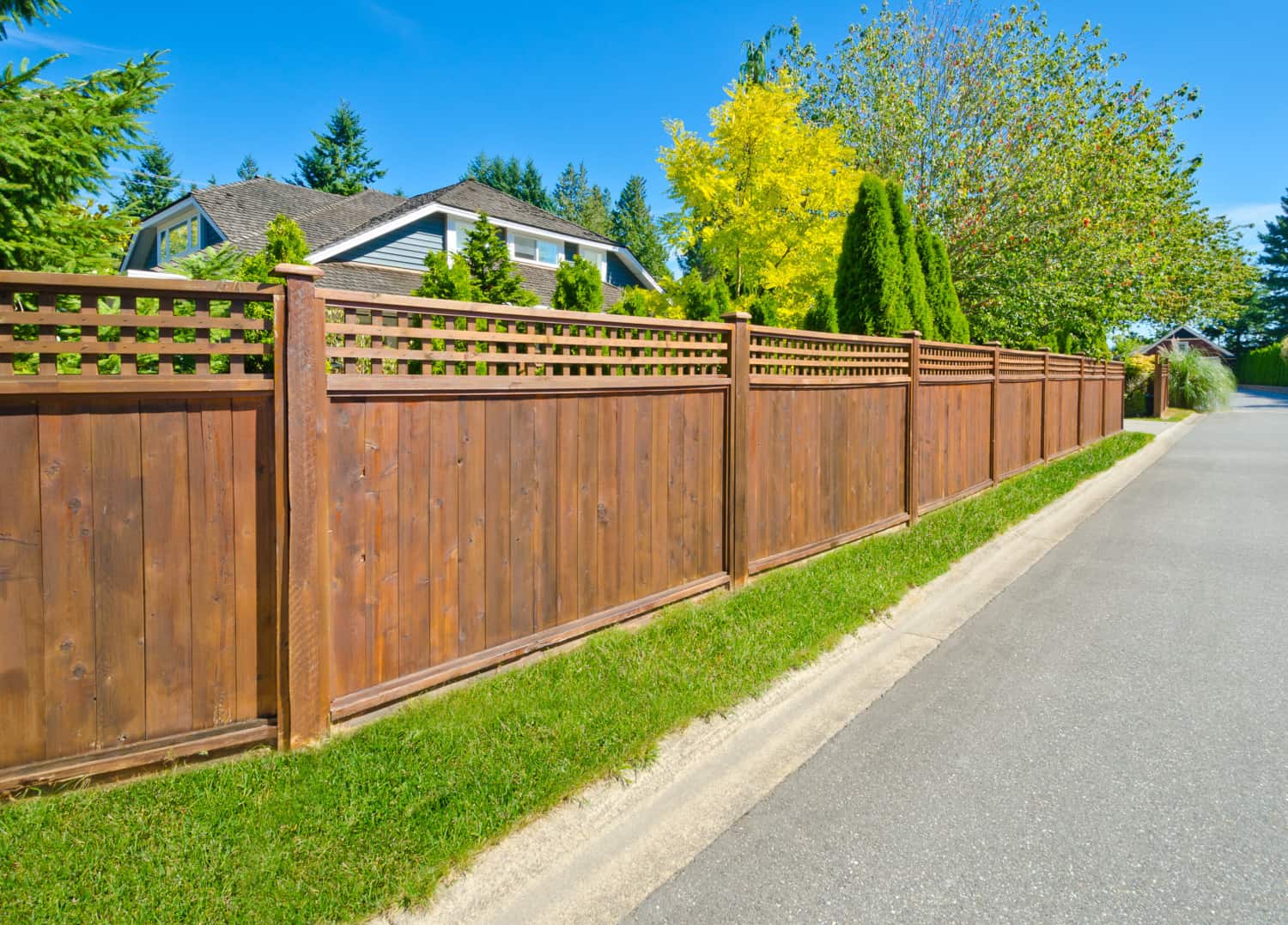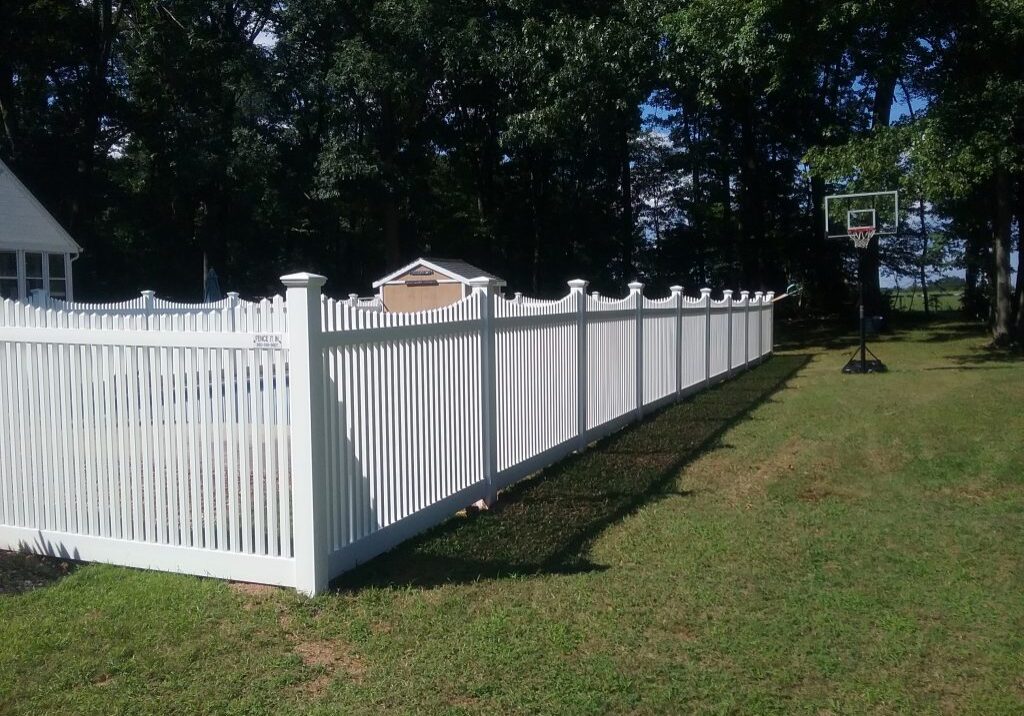All Categories
Featured
Choosing the best fencing product for your building is not almost aesthetics; it has to do with resilience, privacy, and safety and security. Whether you're looking to enhance the elegance of your home or service, protect your residential property, or develop a private oasis, the product you pick will certainly play a significant duty in achieving your objectives. With numerous secure fencing alternatives available, it is necessary to recognize the benefits and drawbacks of each before making your choice.
Advantages:
All-natural Aesthetic: Timber has a warm, natural charm that enhances the appearance of any residential property. Adjustable: Timber fencings can be painted, tarnished, or left unattended to attain different designs. Privacy: A high timber fencing can supply a high level of privacy for your home. Drawbacks:
Upkeep Required: Timber fences need normal upkeep, consisting of discoloration and sealing to avoid damage from climate and bugs. Vulnerable to Climate: Wood can warp, rot, or come to be plagued with termites otherwise effectively kept. Shorter Lifespan: Compared to materials like vinyl or metal, wood typically has a much shorter lifespan. Best For: Property owners seeking a typical, personalized, and all-natural appearance.
![]()
Benefits:
Low Upkeep: Vinyl does not require painting, discoloration, or securing. It's simple to tidy with a straightforward hose pipe down. Long lasting: Resistant to rot, termites, and weather condition, vinyl fencings last much longer than wood fences. Selection of Styles: Offered in numerous styles, colors, and appearances to fit any type of property. Drawbacks:
Greater Initial Expense: The in advance expense of vinyl fencing is typically more than wood or chain web link. Prone to Fracturing: In severe cold or with heavy influence, vinyl fencings can crack or damage. Less Adjustable: Unlike timber, plastic provides less options for paint or discoloration. Best For: Property owners or businesses seeking a low-maintenance, resilient, and durable secure fencing choice.
Benefits:
Toughness and Resilience: Steel fences are strong, immune to use, and lasting. Reduced Maintenance: Once mounted, steel fences require little upkeep, particularly aluminum, which withstands corrosion. High Security: Metal fencings are difficult to climb and supply an effective obstacle against intruders. Drawbacks:
Expense: Steel fences, particularly functioned iron and steel, can be more pricey than other alternatives. Corrosion and Corrosion: Steel fences, particularly, may corrosion without correct treatment. Aluminum is corrosion-resistant, but functioned iron requires routine maintenance. Limited Privacy: Metal fencings do not provide much privacy unless they are combined with other products, like timber slats or vinyl inserts. Best For: Those that focus on security and toughness over privacy, or those with a high end residential property seeking an elegant, classic fencing.
Advantages:
Economical: Chain web link is just one of one of the most budget friendly secure fencing options available. Low Maintenance: As soon as mounted, chain web link fencings need little maintenance past occasional cleansing. Durable: Chain link is solid and can last for numerous years if effectively maintained. Drawbacks:
![]()
Limited Aesthetic appeals: Wire mesh fence do not offer the visual charm of wood or wrought iron, and can look practical. Personal privacy Issues: Unless privacy slats or vinyl coatings are added, wire mesh fence do not provide much privacy. Much less Protected in Some Locations: While chain link offers security, it can be conveniently scaled or cut if not set up with added protection functions. Best For: Business homes, huge houses, or locations where protection is more crucial than looks.
Advantages:
Reduced Upkeep: Compound fences require no staining, securing, or painting. Durability: Immune to insects, rot, and climate damage, composite fences last much longer than wood. Eco-Friendly: Many composite fencings are made from recycled materials, making them a sustainable choice. Negative Aspects:
Greater Price: Composite fences can be more costly than conventional wood or vinyl options. Limited Customization: While readily available in various shades and designs, composite fencings do not use the very same modification options as wood fences. Heavy: Compound secure fencing products can be larger than various other options, making setup a lot more labor-intensive. Best For: Eco-conscious house owners or organizations looking for a low-maintenance, resilient, and lasting secure fencing material.
Final thought. Selecting the appropriate fencing material for your home eventually depends upon your top priorities-- whether it's safety, personal privacy, looks, or low upkeep. From traditional timber and economical chain link to long lasting plastic and strong metal, each product supplies unique advantages suited to different demands. By thinking about factors like budget, installment time, maintenance requirements, and long-lasting resilience, you can pick the excellent fence that meets your home's details demands.
- Timber Fence. Timber is just one of the most prominent fencing materials because of its convenience, timeless appeal, and natural look. It's perfect for properties and can be utilized in a range of designs, including privacy fencings, picket fencings, and post-and-rail fences.
Advantages:
All-natural Aesthetic: Timber has a warm, natural charm that enhances the appearance of any residential property. Adjustable: Timber fencings can be painted, tarnished, or left unattended to attain different designs. Privacy: A high timber fencing can supply a high level of privacy for your home. Drawbacks:
Upkeep Required: Timber fences need normal upkeep, consisting of discoloration and sealing to avoid damage from climate and bugs. Vulnerable to Climate: Wood can warp, rot, or come to be plagued with termites otherwise effectively kept. Shorter Lifespan: Compared to materials like vinyl or metal, wood typically has a much shorter lifespan. Best For: Property owners seeking a typical, personalized, and all-natural appearance.
- Vinyl (PVC) Fence. Vinyl fences are a progressively popular option because of their reduced maintenance and sturdiness. Made from synthetic materials, vinyl fencings are immune to rot, decay, and insects. Available in a variety of colors and designs, vinyl fencing can be created to mimic the appearance of timber without the connected upkeep.

Benefits:
Low Upkeep: Vinyl does not require painting, discoloration, or securing. It's simple to tidy with a straightforward hose pipe down. Long lasting: Resistant to rot, termites, and weather condition, vinyl fencings last much longer than wood fences. Selection of Styles: Offered in numerous styles, colors, and appearances to fit any type of property. Drawbacks:
Greater Initial Expense: The in advance expense of vinyl fencing is typically more than wood or chain web link. Prone to Fracturing: In severe cold or with heavy influence, vinyl fencings can crack or damage. Less Adjustable: Unlike timber, plastic provides less options for paint or discoloration. Best For: Property owners or businesses seeking a low-maintenance, resilient, and durable secure fencing choice.
- Steel Fencing (Aluminum, Steel, and Wrought Iron) Metal fences are known for their strength, security, and aesthetic value. Light weight aluminum, steel, and wrought iron fencings are typically used in household, business, and commercial setups, providing high levels of security and a sophisticated appearance.
Benefits:
Toughness and Resilience: Steel fences are strong, immune to use, and lasting. Reduced Maintenance: Once mounted, steel fences require little upkeep, particularly aluminum, which withstands corrosion. High Security: Metal fencings are difficult to climb and supply an effective obstacle against intruders. Drawbacks:
Expense: Steel fences, particularly functioned iron and steel, can be more pricey than other alternatives. Corrosion and Corrosion: Steel fences, particularly, may corrosion without correct treatment. Aluminum is corrosion-resistant, but functioned iron requires routine maintenance. Limited Privacy: Metal fencings do not provide much privacy unless they are combined with other products, like timber slats or vinyl inserts. Best For: Those that focus on security and toughness over privacy, or those with a high end residential property seeking an elegant, classic fencing.
- Chain Link Fence. Wire mesh fence are among the most useful and inexpensive options available. Frequently made use of in industrial settings, they can likewise be a great option for houses, specifically if safety and security is a top concern. Wire mesh fence are readily available in numerous elevations and can be tailored with personal privacy slats for added protection.
Advantages:
Economical: Chain web link is just one of one of the most budget friendly secure fencing options available. Low Maintenance: As soon as mounted, chain web link fencings need little maintenance past occasional cleansing. Durable: Chain link is solid and can last for numerous years if effectively maintained. Drawbacks:

Limited Aesthetic appeals: Wire mesh fence do not offer the visual charm of wood or wrought iron, and can look practical. Personal privacy Issues: Unless privacy slats or vinyl coatings are added, wire mesh fence do not provide much privacy. Much less Protected in Some Locations: While chain link offers security, it can be conveniently scaled or cut if not set up with added protection functions. Best For: Business homes, huge houses, or locations where protection is more crucial than looks.
- Compound Fencing. Compound fences integrate wood fibers and plastic to produce a sturdy, green alternative to traditional wood secure fencing. These fencings have the appearance of wood but require a lot less upkeep and are resistant to rot, pests, and fading.
Advantages:
Reduced Upkeep: Compound fences require no staining, securing, or painting. Durability: Immune to insects, rot, and climate damage, composite fences last much longer than wood. Eco-Friendly: Many composite fencings are made from recycled materials, making them a sustainable choice. Negative Aspects:
Greater Price: Composite fences can be more costly than conventional wood or vinyl options. Limited Customization: While readily available in various shades and designs, composite fencings do not use the very same modification options as wood fences. Heavy: Compound secure fencing products can be larger than various other options, making setup a lot more labor-intensive. Best For: Eco-conscious house owners or organizations looking for a low-maintenance, resilient, and lasting secure fencing material.
Final thought. Selecting the appropriate fencing material for your home eventually depends upon your top priorities-- whether it's safety, personal privacy, looks, or low upkeep. From traditional timber and economical chain link to long lasting plastic and strong metal, each product supplies unique advantages suited to different demands. By thinking about factors like budget, installment time, maintenance requirements, and long-lasting resilience, you can pick the excellent fence that meets your home's details demands.
Latest Posts
Boost Your Residential Or Commercial Property with Overhead Door Equipment
Published May 06, 25
1 min read
Why Complete Circle Marketing is Your Media Planning Companion
Published May 06, 25
1 min read
Why Choose Chain-Link Fence?
Published May 06, 25
1 min read